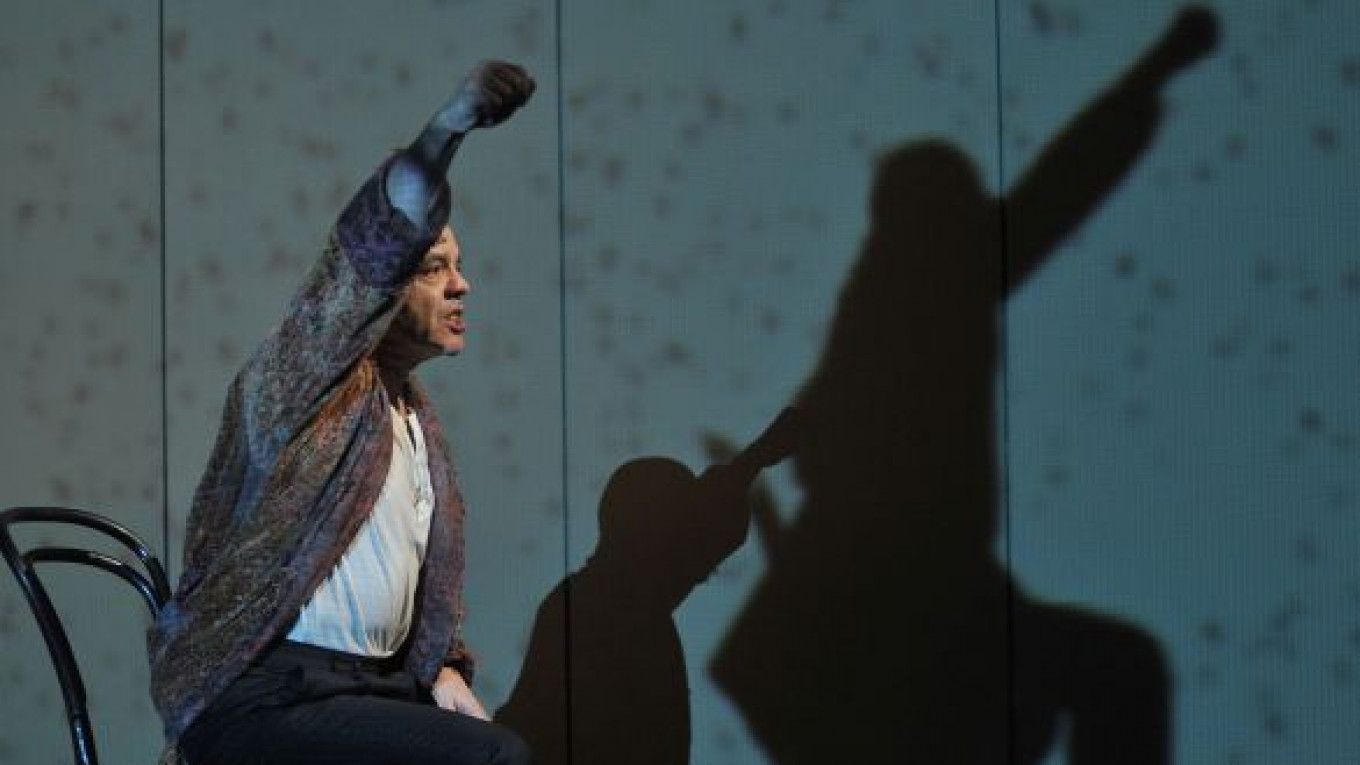The first word that comes to mind when I think of “Konstantin Raikin: An Evening with Dostoevsky” at the Satirikon Theater is “luxury.”
It is hardly the only word; hundreds more will follow. But it is surely the most unexpected, which makes me want to start with it.
Konstantin Raikin. Alone on stage. Valery Fokin at the director’s table. Alexander Bakshi composing the music. Alexander Borovsky creating the environment, which, like Bakshi’s music, is so simple that it is pregnant with endless possibilities.
Now that is a luxurious picture for anyone who knows Russian theater.
But before we get to that, allow me an aside.
Years ago I sat next to Julie Christie at the Satirikon’s now-legendary production of Franz Kafka’s “The Metamorphosis.” Ms. Christie was transfixed as she watched Raikin’s Gregor Samsa transform into an insect, clicking and clacking his tongue and wiggling his fingers and toes.
By the end of the show she was visibly moved and, in a way that only a professional colleague can be, deeply admiring of what she had witnessed.
I even got a brief note from her months later that ended with her asking me to “say hello to my friend, Konstantin” when next I would see him. She was still thinking of that show.
My point is this: Raikin is an unforgettable actor. Call it charisma. Call it control. Call it talent, genius or gift. Call it what you want. Raikin’s presence on a stage somehow realigns the molecular structure of the air in the hall. Everything becomes clearer and acquires a deeper meaning.
This, I repeat, is a rare luxury. There are a plethora of fine actors in Moscow. A long line of great performances. There is only one Konstantin Raikin.
There is, however, more than a flash of deja vu in “An Evening with Dostoevsky,” which is based on “Notes From Underground,” Fyodor Dostoevsky’s seminal novella about a “sick, spiteful man” tossing down gauntlets before anyone and everything he encounters.
Decades ago, Fokin staged this same work with Raikin under the title of “And I’ll Go, I’ll Go.” Moreover, it was the team of Fokin, Raikin and Bakshi that created that memorable “Metamorphosis.”
At one moment in the new show, Raikin even offers a visual quote from the Kafka adaptation. He utters a few words about being an insect and, with a sly smile on his face, wiggles his fingers like a bug just as he did 15 years ago.
Dostoevsky’s novella is a shattering attack on logic, complacency, pride and the way of the world.
Fokin’s new version of it takes an interesting tack by commencing with what we might call a couple of false starts.
The elegant Raikin, dressed in a sharp suit, walks on stage and begins reading from a book. That is, he begins reading silently. At least until the audience begins to laugh. He then evokes laughter again by reading out loud, as if to a room of pupils in an elementary school.
More laughter comes when Raikin digs back into his personal heritage — his father Arkady was arguably the most famous and beloved comic actor of the second half of the 20th century in the Soviet Union — and begins pulling faces and doing dance steps that turn Dostoevsky’s text into a screwball comic sketch.
Like the Underground Man he plays, Raikin taunts the audience, teases it, insults it and occasionally appeals to it.
The tone shifts in the second half when Raikin’s antihero encounters a meek prostitute, whom he subjects to cruel philosophical and psychological tirades. Raikin plays it as if he were suffering from a split personality. Only a female’s shadows shimmering on the wall suggest that this is more than a feverish nightmare playing itself out in the character’s troubled mind.
Shadows, in fact, play a major role in Fokin’s vision of this individual as one who suffers from acute inferiority and superiority complexes all at once. Light changes dwarf Raikin beneath monstrous shadows, or, on the contrary, shrink the traces he casts on the wall down to a nub. At other times, shadows get up and walk away, leaving the actor behind.
Through it all, Raikin is in complete command, whether he is playing the slapstick inherited from his father, or whether he is digging down to the tragic depths that Dostoevsky plumbed.
“An Evening with Dostoevsky” is full of riches — great acting meeting great literature. That is my idea of a luxurious evening.
“Konstantin Raikin: An Evening with Dostoevsky” (Konstantin Raikin: Vecher s Dostoevskim) plays Thursday, Friday, Tuesday, Oct. 22, 28 and 29 at 7 p.m. at the Satirikon Theater, located at 8 Sheremetyevskaya Ulitsa. Metro Marina Roshcha. Tel. 698-7844, www.satirikon.ru. Running time: 1 hour, 50 minutes.
A Message from The Moscow Times:
Dear readers,
We are facing unprecedented challenges. Russia's Prosecutor General's Office has designated The Moscow Times as an "undesirable" organization, criminalizing our work and putting our staff at risk of prosecution. This follows our earlier unjust labeling as a "foreign agent."
These actions are direct attempts to silence independent journalism in Russia. The authorities claim our work "discredits the decisions of the Russian leadership." We see things differently: we strive to provide accurate, unbiased reporting on Russia.
We, the journalists of The Moscow Times, refuse to be silenced. But to continue our work, we need your help.
Your support, no matter how small, makes a world of difference. If you can, please support us monthly starting from just $2. It's quick to set up, and every contribution makes a significant impact.
By supporting The Moscow Times, you're defending open, independent journalism in the face of repression. Thank you for standing with us.
Remind me later.







